|
In this issue:
UPCOMING EVENTS
PECC SINGAPORE CONFERENCE | SINGAPORE | 26-27 FEBRUARY 2015
 The Singapore National Committee for Pacific Economic Cooperation (SINCPEC) and the Philippine Pacific Economic Cooperation Committee (PPECC) are co-organizing annual Singapore PECC conference in support of APEC 2015 chaired by the Philippines. The Singapore National Committee for Pacific Economic Cooperation (SINCPEC) and the Philippine Pacific Economic Cooperation Committee (PPECC) are co-organizing annual Singapore PECC conference in support of APEC 2015 chaired by the Philippines.
During the APEC Leaders’ Meeting held in Beijing in November 2014, key decisions were taken to make progress on key elements of the regional agenda, including on a Free Trade Area of the Asia-Pacific (FTAAP) and improving connectivity. The challenge is how regional economies can implement these plans to ensure that regional growth is not only sustainable but also inclusive.
The conference will consist of five plenary sessions on the following themes:
1) Asia-Pacific Economic Cooperation in a Changing Global Context: Risks and Opportunities
2) Inclusive Growth: Building Capacity at Individual and Community Levels
3) Connectivity and Regional Economic Integration: Reaping the Benefits of Economic Integration
4) Financing Inclusive Growth
5) Making Regional Economic Integration More Inclusive
Program agenda (PDF, 63KB)
PAST EVENTS
PECC MEDIA ROUNDTABLE: APEC 2015 | MANILA, PHILIPPINES | 12 DECEMBER 2014
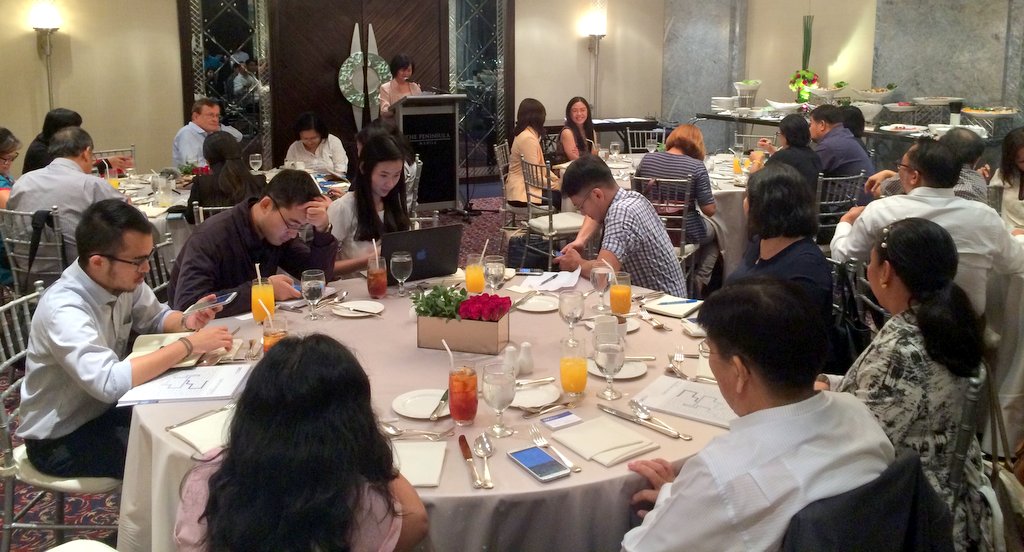 The Philippines, as the host of APEC in 2015, held the APEC Informal Senior Officials' Meeting (ISOM) in Manila on 8-9 December 2014 in preparation for the following year's agenda under the main theme of inclusive economic growth. On this occasion, PECC organized a media roundtable over lunch on the 12th that gathered foreign correspondents and local media representatives covering economic and trade news to discuss some of the issues on the APEC 2015 agenda and to gauge media's interest. Fact sheets on Free Trade Area of the Asia-Pacific (FTAAP) and a glossary of trade terms frequently used by PECC and APEC were distributed at the roundtable cum briefing. Undersecretary Laura Del Rosario, the Philippine senior official for APEC and incoming SOM chair from the Department of Foreign Affairs delivered opening remarks as the guest-of-honor and informed the media of the prioritized issues that were raised during the ISOM. The Philippines, as the host of APEC in 2015, held the APEC Informal Senior Officials' Meeting (ISOM) in Manila on 8-9 December 2014 in preparation for the following year's agenda under the main theme of inclusive economic growth. On this occasion, PECC organized a media roundtable over lunch on the 12th that gathered foreign correspondents and local media representatives covering economic and trade news to discuss some of the issues on the APEC 2015 agenda and to gauge media's interest. Fact sheets on Free Trade Area of the Asia-Pacific (FTAAP) and a glossary of trade terms frequently used by PECC and APEC were distributed at the roundtable cum briefing. Undersecretary Laura Del Rosario, the Philippine senior official for APEC and incoming SOM chair from the Department of Foreign Affairs delivered opening remarks as the guest-of-honor and informed the media of the prioritized issues that were raised during the ISOM.
Ambassador Antonio Basilio (PPECC/ ABAC), Dr. Charles Morrison (USAPC/ President of East-West Center), and Eduardo Pedrosa (Secretary General of PECC) interacted with the 26 invited media participants over issues that covered free trade agreements, Philippine priorities, and regional economic integration during the two-hour event. The Foreign Correspondents Association of the Philippines (FOCAP) assisted with the invitations.
STATE OF THE REGION 2014-2015 RELEASED DURING APEC LEADERS' WEEK | BEIJING, CHINA | NOVEMBER 7, 2014
 State of the Region 2014-2015 report was released on the 7th November 2014 during the APEC Leaders' Week in Beijing through a press conference. The briefing was given by: Mr. Eduardo Pedrosa, Secretary General of PECC and Coordinator of the Report; Mr. Jusuf Wanandi (Indonesia), co-chair of PECC; and Ambassador Don Campbell (Canada), co-chair of PECC. State of the Region 2014-2015 report was released on the 7th November 2014 during the APEC Leaders' Week in Beijing through a press conference. The briefing was given by: Mr. Eduardo Pedrosa, Secretary General of PECC and Coordinator of the Report; Mr. Jusuf Wanandi (Indonesia), co-chair of PECC; and Ambassador Don Campbell (Canada), co-chair of PECC.
The State of the Region report is the flagship annual publication of PECC. It includes a survey of opinion-leaders on the priorities for Asia-Pacific cooperation and this year, 602 participated in the survey. A special chapter was dedicated to study the different pathways underway towards the creation of an FTAAP (Free Trade Area of the Asia-Pacific) including the Trans-Pacific Partnership (TPP) and the Regional Comprehensive Economic Partnership (RCEP), and their relationship to APEC membership.
Related press releases
Related news reports
ENERGY TRANSITION: A CHALLENGING PERSPECTIVE FOR THE PACIFIC ISLANDS AND COASTAL AREAS | NOUMEA, NEW CALEDONIA | 26-28 NOVEMBER 2014
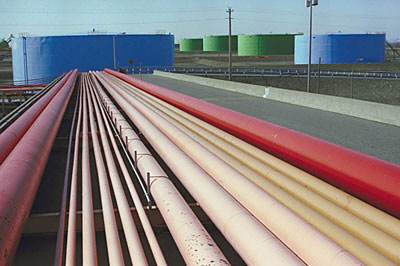 Some of the region's economies are more advanced than others in rolling out forward-looking energy transition policies, in providing funding and implementing environmental regulations conducive to such transition. The project aimed to highlight some of those experiences that are geared to pave the way for smooth energy transition. Through a series of three seminars, the project brought together both the energy-exporting and importing economies, energy producers and distributors as well as energy-related policymakers. Some of the region's economies are more advanced than others in rolling out forward-looking energy transition policies, in providing funding and implementing environmental regulations conducive to such transition. The project aimed to highlight some of those experiences that are geared to pave the way for smooth energy transition. Through a series of three seminars, the project brought together both the energy-exporting and importing economies, energy producers and distributors as well as energy-related policymakers.
The four topics discussed at Noumea seminar:
Session 1. Policies for renewable energies in the Pacific islands and coastal areas
Session 2. Economic models and financing policies for energy transition in the Pacific and coastal areas
Session 3. Technological challenges: Energy storage and efficiency, integration to existing networks
Session 4. Towards greater energy efficiency in coastal areas and Pacific islands
This two-year project was led by FPTPEC (France Pacific Territories Committee for Pacific Economic Cooperation) which collaborated with other PECC committees in three different locations:
Seminar 1: Victoria, Canada | November 7-8, 2013
Seminar 2: Santiago, Chile | June 24-25, 2014
Seminar 3. Nouméa, New Caledonia | November 26-28, 2014 (download presentations)
Download program agenda (PDF, 170kb)
MEMBER UPDATES
KIM DIETRICH PASSES AWAY
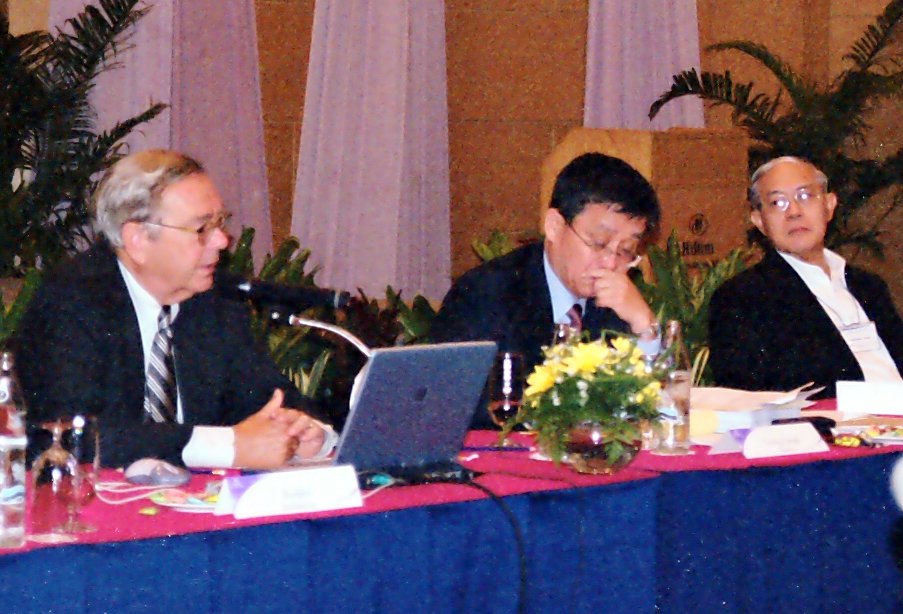
An expert on banking and financial intermediation, Professor John Kimball Dietrich (University of Southern California Marshall School of Business) has passed away on 25 January 2015. Kim is survived by his wife, USC Marshall Professor Judith Blumenthal, two children, and five grandchildren. Kim was one of the pioneers in thinking about Asia-Pacific cooperation on financial policy issues bringing his considerable expertise on the development of the US financial markets to enrich discussions on the future of finance in Asia.
[photo, l-r: Kim Dietrich, Soogil Young, Jesus Estanislao at PECC Finance Forum: Issues and Challenges for Regional Financial Cooperation in the Asia-Pacific, held in Hua Hin, Thailand in July 2003]
Kim’s style and knowledge were much appreciated at a time of great uncertainty following the Asian financial crisis, and his contributions focused on the development of debt capital markets provided a rich source of ideas influencing a future vision of the region. In particular, his work focused on trying to think of ways to improve sources of domestic funding for small and medium companies in the region to provide more stable sources of funding with exposure to the double mismatch of maturities and currencies that had characterized corporate funding in the lead up to the 1997-98 crisis. Many of his ideas and suggestions such as the use of second board markets and venture capital are yet to be fully realized in emerging Asia-Pacific economies. However, with today’s agenda focused on inclusive growth and small and medium enterprises (SMEs), Kim’s rich legacy leaves much for future architects of financial market development to build on. More...
AUSPECC: GRAEME HUGO PASSES AWAY
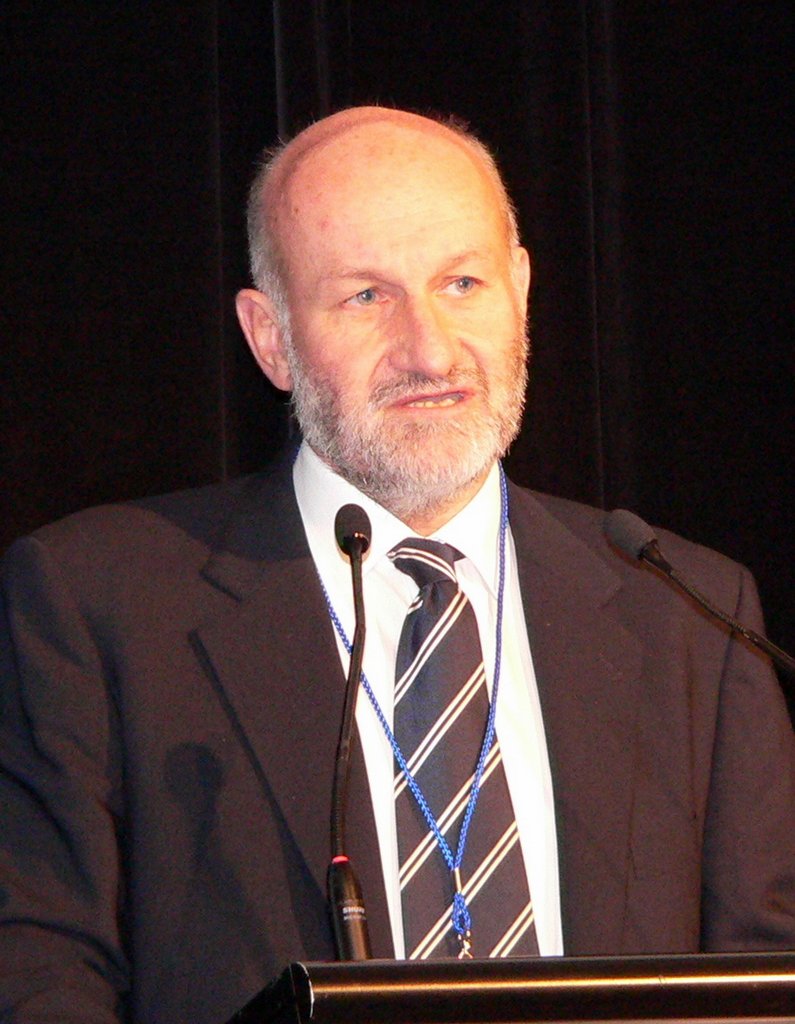 Graeme Hugo, one of Australia’s most respected demographers and intellectual, who had made valuable contributions to PECC discussions in the past, has passed away in January 2015 at the age of 68 after a short battle with cancer. Graeme Hugo, one of Australia’s most respected demographers and intellectual, who had made valuable contributions to PECC discussions in the past, has passed away in January 2015 at the age of 68 after a short battle with cancer.
[photo: Graeme Hugo speaking at 17th PECC General Meeting | Sydney, Australia | May 2007]
He was Professor of Geography, Director of the Australian Population and Migration Research Centre at the Adelaide University, and also an Australian Research Council Australian Professorial Fellow. His research interests ranged widely in scope that included migration, climate change, health, and living standards that have impact on population. He was an active contributor to academic and public discourse on demographic issues, shared in over 400 publications including books, journal articles, conference papers, and was a regular media commentator. He also supervised more than 50 PhD theses. He held an ARC Federation Fellowship between 2002 and 2007, and has held various positions with Federal Government agencies and committees. He was on the Australian Statistical Advisory Committee and in 2012, was appointed deputy chair of the Aged Care Financing Authority and a member of the National Sustainability Council. Same year, he was also named an Officer of the Order of Australia for his distinguished service to population research. More...
USAPC: CHARLES E. MORRISON AT 'MEGA-FTAS AND THE GLOBAL POLITICAL ECONOMY' | BERKELEY, CA, USA | 24-25 OCTOBER 2014
Dr. Charles E. Morrison (Standing Committee member for USAPC and former Chair of PECC) contributed to an academic conference organized by the Berkeley APEC Study Center to explore the dynamics of mega-FTAs in progress, including the Trans-Pacific Partnership (TPP), the Transatlantic Trade and Investment Partnership (TTIP), and the Regional Comprehensive Economic Partnership (RCEP). He participated as a discussant on a panel: The Security Implications of Mega-FTAs.
Among the questions addressed at the conference by invited scholars from the US, Asia, and Europe were:
- What are the economic and political goals of countries that decide to participate in mega-FTA negotiations?
- How do negotiation processes evolve in different political systems?
- What are the implications of regional mega-FTAs for the regional security and political order?
PUBLICATIONS
CONFERENCE ON NEW PRIORITIES OF REGIONAL ECONOMIC INTEGRATION - MANDATE FOR APEC
 Year 2014 marked the 25th anniversary of APEC and twenty years since the Bogor Goals were launched. PECC, having paved the way for APEC's establishment, took the opportunity of its annual Singapore conference to reflect on how the global landscape has evolved since and to consider what the 'new priorities' of APEC might be. This report contains contents of the discussions held during the plenary sessions as well as keynote speeches by Mr. Lim Hng Kiang (Minister for Trade and Industry, Singapore), Mr. La Yifan (Vice Chairman, APEC SOM and Under Secretary-General, National Organizing Committee for APEC 2014, Ministry of Foreign Affairs, China), and Dr. Bambang Permadi Soemantri Brodjonegoro (Vice Minister for Finance, Indonesia). Year 2014 marked the 25th anniversary of APEC and twenty years since the Bogor Goals were launched. PECC, having paved the way for APEC's establishment, took the opportunity of its annual Singapore conference to reflect on how the global landscape has evolved since and to consider what the 'new priorities' of APEC might be. This report contains contents of the discussions held during the plenary sessions as well as keynote speeches by Mr. Lim Hng Kiang (Minister for Trade and Industry, Singapore), Mr. La Yifan (Vice Chairman, APEC SOM and Under Secretary-General, National Organizing Committee for APEC 2014, Ministry of Foreign Affairs, China), and Dr. Bambang Permadi Soemantri Brodjonegoro (Vice Minister for Finance, Indonesia).
Download the publication (PDF, 2.27MB)
2014 program agenda
COOPERATION AND COMPETITION IN THE EXTRACTIVE INDUSTRIES SECTOR – PERSPECTIVES FROM DEMAND AND SUPPLY SIDES
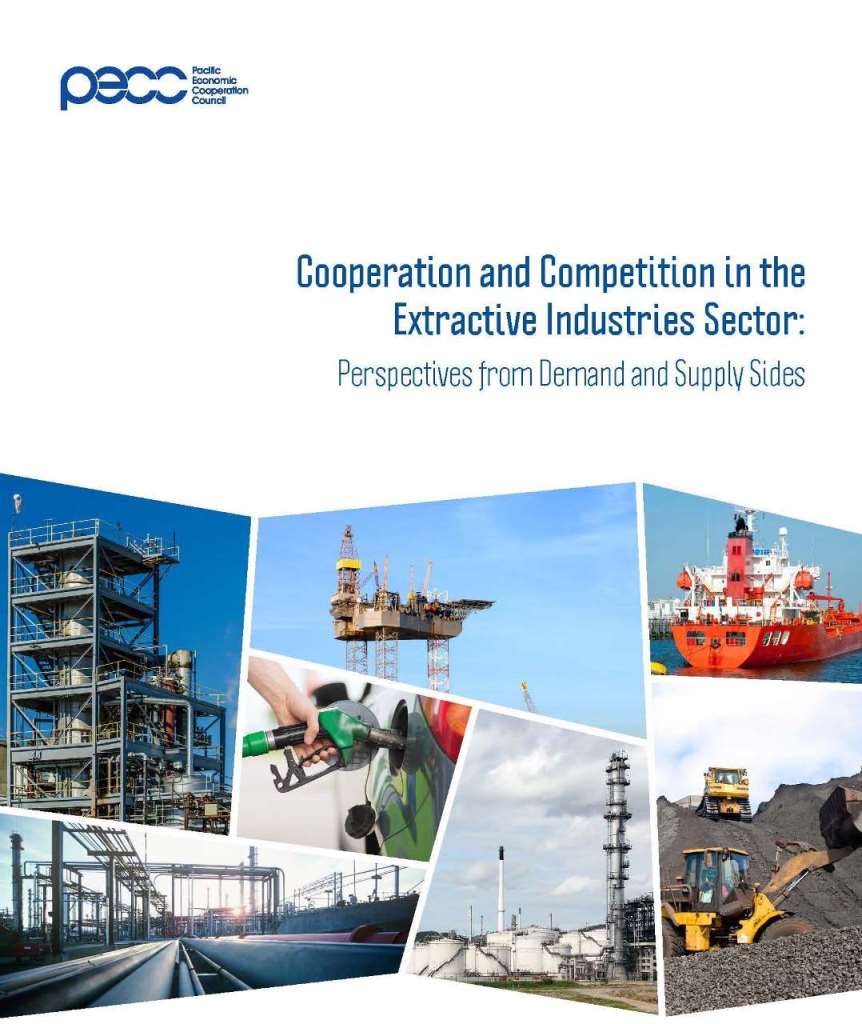 From roughly 2001 till the onset of the Global Financial Crisis, commodity prices boomed largely as a result of the rapid increase in demand associated with robust growth in emerging markets. While nominal global GDP grew by 8% annually between 1964 and 2011, total commodity trade for the major minerals and metals grew significantly faster, at an annual 11%. In the more recent period 2004 to 2011, the trade value for primary commodities grew by 18% while nominal global GDP grew by 7%. From roughly 2001 till the onset of the Global Financial Crisis, commodity prices boomed largely as a result of the rapid increase in demand associated with robust growth in emerging markets. While nominal global GDP grew by 8% annually between 1964 and 2011, total commodity trade for the major minerals and metals grew significantly faster, at an annual 11%. In the more recent period 2004 to 2011, the trade value for primary commodities grew by 18% while nominal global GDP grew by 7%.
This boom was largely led by Asia’s fast-growing economies which have driven and most likely will continue to drive extractive industry markets, especially for energy, in the coming decades.
In this context, what are the key policy issues for exporting and importing economies of the products of the extractive industries and how might regional cooperation make a contribution to resolving those issues?
This PECC publication contains views from two perspectives: one from the supply-side and the other from the demand-side, contributed by Tilak K. Doshi (Energy Studies Institute, Singapore) and Yu Nagatomi (Institute of Energy Economics, Japan) respectively.
Download the report (PDF, 4.34MB)
STATE OF THE REGION 2014-2015
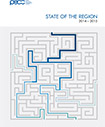 According to the State of the Region 2014-2015 report released from Beijing, China on November 7th 2014 during the APEC Leaders' Week, the region needs to undertake significant reforms over the coming months and years to maintain its strong growth. PECC’s annual survey of the regional policy community identified technological innovation; policy reform; trade (to both emerging and advanced economies); and investment in infrastructure as the future drivers of growth over the next 5-10 years. These engines are needed to replace the region’s reliance on exports as the primary engine of growth. According to the State of the Region 2014-2015 report released from Beijing, China on November 7th 2014 during the APEC Leaders' Week, the region needs to undertake significant reforms over the coming months and years to maintain its strong growth. PECC’s annual survey of the regional policy community identified technological innovation; policy reform; trade (to both emerging and advanced economies); and investment in infrastructure as the future drivers of growth over the next 5-10 years. These engines are needed to replace the region’s reliance on exports as the primary engine of growth.
The most important factors identified by the annual PECC survey for future growth prospects of the region were: the success of structural reforms in China, further liberalization and improvements to the rule of law. These factors were echoed throughout the survey findings which placed a slowdown in the Chinese economy; a lack of political leadership in the region; and failure to implement structural reforms as the top three risks to growth.
Of 602 opinion-leaders who contributed to this year's PECC survey, 164 were from the business sector, 121 from government, and 317 from the rest – academia, media, and/or civil society.
Download State of the Region 2014-2015 (PDF, 500KB)
DISCUSSION FORUM
APEC after 25 years: A look backward and a thought forward
by Narongchai Akrasanee, Minister of Energy, Thailand/ Chair, Thailand National Committee of Pacific Economic Cooperation (TNCPEC)
Asia-Pacific Economic Cooperation (APEC) is 25 years old this week and the leaders of its 21 member economies, the world’s largest regional economic group, will be hosted by China’s President Xi Jinping in Beijing to celebrate.
Although officially APEC is 25 years old, the so-called APEC attempt, or attempt at economic cooperation among the Asia-Pacific economies (countries) began more than 40 years ago.
The first group of people who saw the benefits of economic cooperation in Asia-Pacific was businesspeople. They saw the opportunity for trade and investment, or the opportunity to make money. This is not unlike the Arab/Indian merchants who sought trade cooperation with Southeast Asia more than 1,000 years ago or the merchants along the famous Asian Silk Road. Another route of development that eventually reached to APEC was through academia, through the development of public-policy thought. Read more...
APEC at 25: Relevance for the future global system
by Jusuf Wanandi, Co-chair, PECC
The Asia-Pacific Economic Cooperation (APEC) forum celebrates its 25th anniversary this year. This milestone presents a chance for reflection on achievements as well as the future. Although most think of APEC in terms of the Bogor Goals of free trade and investment, these were the chosen means to an end — that end being “accelerated, balanced and equitable economic growth not only in the Asia-Pacific region, but throughout the world as well”.
Since 1989, the average income in the region has tripled from around US$5,000 to above $15,000. Asia- Pacific is now the world’s strongest growth center. The non-OECD economies of Asia-Pacific, notably China, have evolved into great traders. Asia-Pacific has also caught up very fast in the origination and hosting of the cross-border flows of capital and people. More importantly, the number of people living on less than $2 a day in the region has dropped from close to 1.2 billion to 412 million. Read more...
|











